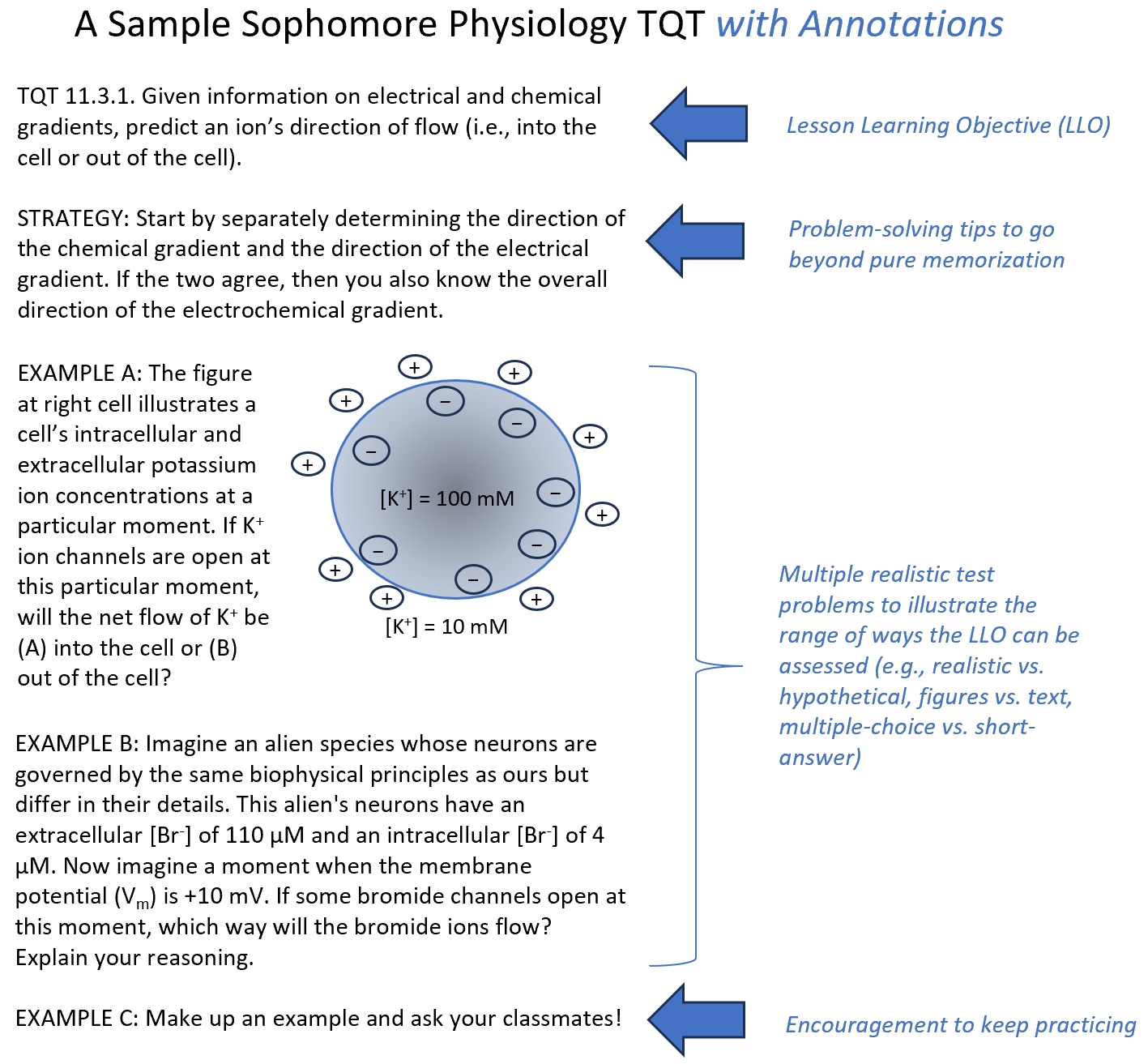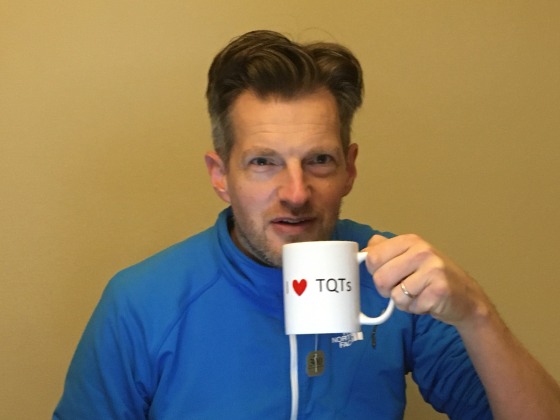Summative Assessment
For many years, I (Greg) struggled with a common teaching dilemma: how can I help my undergraduate students develop transferrable knowledge and skills in courses dominated by high-stakes tests that traditionally reward memorization above all else?
In 2019, I and my mentor Lekelia (Kiki) Jenkins (Arizona State University) were grappling with the issue of alignment between active-learning exercises and summative assessments. Would students engage in activities that did not directly relate to problems they would face on subsequent exams? Working together via Sue Wick's PALM Network, Kiki and I were adding more active learning to my Human Anatomy & Physiology courses, but we were stymied by the alignment issue, for which the field of science education seemed to lack scalable solutions.
As we pondered this dilemma, I came across an essay by Ben Wiggins (then at the University of Washington, now at Shoreline Community College) on his Public Exam system. Public Exams' matching of ambitious learning goals with actual exam questions -- consistent with the general principle of backward design (McTighe & Thomas 2003) -- appealed strongly to me and Kiki, who, with help from Ben, then adapted some aspects of this approach to formulate a related but distinct assessment framework that we dubbed Test Question Templates, or TQTs for short. Early TQT dissemination efforts led two additional faculty -- Usha Sankar (then at Fordham University, now at Drexel University) and Marcus Lawrence (Southern Utah University) -- to seek my mentorship via the PALM Network, as I had previously done with Kiki. These new pairings have led to further explorations of TQTs and further interest from other members of the science education community.
This TQT origin story shows that the development of the TQT framework is not attributable to a single individual, but instead reflects the input of a community of science educators spanning a range of roles at a range of institutions. In this spirit, Ben and I are now collaborating on an NSF-funded project on Exam Previews, a general strategy that encompasses both Public Exams and TQTs!
A Test Question Template is a student-facing resource that explicitly connects a Lesson Learning Objective (LLO) with multiple specific examples of how that LLO might be assessed on a test. TQTs thus show students what they will need to do on tests, and how to practice, without revealing all details of the tests. From the instructor side, TQTs' pre-specification of test question formats makes test-writing more straightforward; by varying certain details within a consistent broader structure, we can generate additional new questions with relative ease.
One example of a TQT is shown below. Hundreds of additional examples are available in a Google Drive folder.

Beyond making tests less stressful and more rewarding for students and instructors, TQTs should generally promote students' transfer of knowledge to new contexts by encouraging practice on multiple examples with different surface features (Kaminske et al. 2020).
Since the TQT framework emphasizes (A) cognition above and beyond straight memorization, (B) transparent alignment of practice and testing, and (C) abundant opportunities for creative and collaborative student practice, it may be considered a cousin of approaches such as specs grading, Mary-Ann Winkelmes' TILT, and Deb Donovan's Learning Targets and Success Criteria.
|
Selected TQT-Related Publications
|
- Gregory J. Crowther. An exam is a moral document [invited article]. Advances in Physiology Education: in review.
- Lauren B. Crowe, Kerri M. Wingert, Thomas A. Knight, Benjamin L. Wiggins, and Gregory J. Crowther. Navigating knowledge networks: The use of Exam Preview methods to support students' transfer of knowledge. International Journal of STEM Education: in review.
- Benjamin L. Wiggins, Kerri M. Wingert, and Gregory J. Crowther. Exam preview methods improve the college student experience of learning science. Science Education: revision in progress.
- Usha Sankar, Erik P. Silldorff, Crystal Uminski, and Gregory J. Crowther. Non-human questions are underutilized tools for assessing higher-order cognitive skills in human physiology. Advances in Physiology Education: 2nd revision in review.
- Yoojin Choi, Lekelia D. Jenkins, and Gregory J. Crowther. Practice it to ace it: students writing practice questions for tests. Advances in Physiology Education 49(2): 534-549.
- Gregory J. Crowther, Merrill D. Funk, Kelly M. Hennessey, and Marcus M. Lawrence (2025). Frontier-model chatbots can help instructors create, improve, and use Learning Objectives. Advances in Physiology Education 49(1): 219-229.
- Benjamin L. Wiggins and Gregory J. Crowther (2024). A survey of exam methods in college A&P courses. HAPS Educator 28(3): 24-44.
- Gregory J. Crowther and Benjamin L. Wiggins (2024). Exam reform: an opportunity for the redistribution of academic power. Journal of Microbiology and Biology Education 25(3): e00119-24.
- Gregory J. Crowther, Victoria L. VanHeel, Sasha D. Gradwell, Casey J. Self, and Krista L. Rompolski (2024). General skills amidst the details: alternative learning objectives and a framework of competencies for human anatomy. Advances in Physiology Education 48(4): 799-807.
- Gregory J. Crowther, Usha Sankar, Leena S. Knight, Debra L. Myers, Kevin T. Patton, Lekelia D. Jenkins, and Thomas A. Knight (2023). Chatbot responses suggest that hypothetical biology questions are harder than realistic ones. Journal of Microbiology and Biology Education 24(3): e00153-23.
- Dilan P. Evans, Lekelia D. Jenkins, and Gregory J. Crowther (2023). Student perceptions of a framework for facilitating transfer from lessons to exams, and the relevance of this framework to published lessons. Journal of Microbiology and Biology Education 24(1): e00200-22.
- Gregory J. Crowther and Thomas A. Knight (2023). Using Test Question Templates (TQTs) to teach physiology core concepts. Advances in Physiology Education 47(2): 202-214.
- Gregory J. Crowther (2021). How do kidneys make urine from blood? Qualitative and quantitative approaches to filtration, secretion, reabsorption, and excretion. CourseSource 8: 42.
- Gregory J. Crowther, Benjamin L. Wiggins, and Lekelia D. Jenkins (2020). Testing in the age of active learning: Test Question Templates help
to align activities and assessments. HAPS Educator 24(1): 74-81.
|
Selected TQT-Related Webinars & Podcasts
|
- Greg Crowther. Outcomes Assessment. New Faculty Institute, Washington State Board of Community and Technical Colleges, August 12, 2024.
- Kevin Patton, Greg Crowther, and Ben Wiggins. Examining the Anatomy & Physiology Exam. TAPP Radio, Episode 149, June 30, 2024.
- Greg Crowther, Hilary Kemp, and Tom Knight. Chatbot responses suggest that hypothetical biology questions are harder than realistic ones. JMBE Live!, May 17, 2024.
- Greg Crowther. Exams on Demand: Using Templates to Write Multiple Equivalent Problems. The Grading Conference, June 4, 2022.
- Hilary Kemp (performing as Joan Jett). I Love TQTs! Northwest PULSE, January 29, 2021.
- Kevin Patton and Greg Crowther. Test Question Templates Help Students Learn. TAPP Radio, Episode 70, June 2, 2020.
|
Ongoing TQT-Related Projects
|
Aside from the products listed above, members of the "TQTeam" are also working on several ongoing projects, as summarized below.
- The Exam Preview Project
- with Shelley Stromholt, Ben Wiggins, and Kerri Wingert
- Exam Previews and Standards-Based/Specs Grading in Human A&P
- with Lisa Anderson, Kiki Jenkins, Staci Johnson, Karen Perell-Gerson, and Usha Sankar
- Using LOs and TQTs to Help Students Integrate Previous Content and New Content
- with Robin Altman, Yoojin Choi, and Kelly Hennessey
- Biology TQT Archive
- TQTs and You and Me?
- Do you have an idea for a TQT-related project? Please get in touch with me (gcrowther at everettcc dot edu)!
Starting in October 2024, the work of Ben Wiggins (PI) and me (Co-PI) on Public Exams and TQTs will be funded by the National Science Foundation! Our $500K proposal was titled Pre-Released Exam Strategy Assessment Research.
We of the TQTeam have also been grateful for past seed money from ADInstruments (HAPS workshop sponsor, 2021), the American Physiological Society (Teaching Career Enhancement Award, 2021-2022), the Everett Community College Foundation (2021-2022), Sue Wick's PALM Network (2018-2022), and Jeff Morris's ROSE Network (2021-2022).

Dr. C sipping some TQTea.
|

